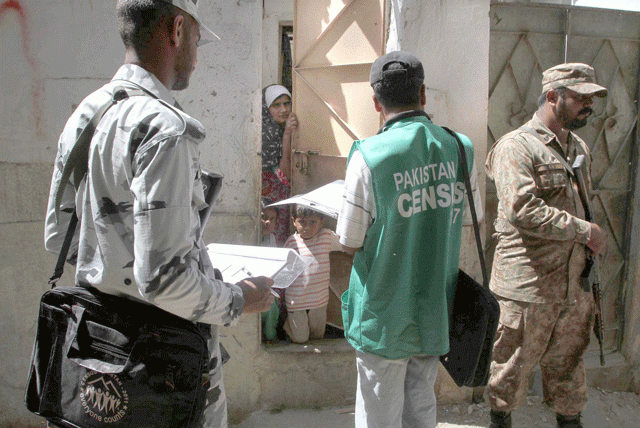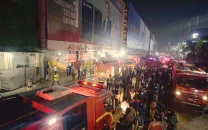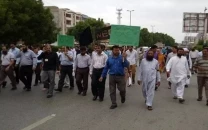Count us out: Assembly members bash national census
Lawmakers unanimously condemn ‘bias’ against Sindh during census process

Lawmakers in the assembly felt that Sindh's population was underrepresented in the census. PHOTO: EXPRESS
Most lawmakers in the House expressed their reservations on the provisional results of the sixth population census during the assembly session but Murad said, “We cannot bluntly reject the census results because it will take us back to the 1998 position.”
While concluding the discussion on an adjournment motion submitted by Pakistan Muslim League – Functional (PML-F) MPA Nusrat Seher Abbasi, he added that the entire census process should not be scrapped; instead the federal statistics department should address Sindh’s grievances.
“You should start your homework in your constituencies and census blocks and come up with suggestions on how to redress your apprehensions and fix the errors," he advised the lawmakers.
Sharjeel Memon lambasts NAB in Sindh Assembly
Murad did, however, endorse other MPAs’ concerns that mistakes had been made by the census staff. "No one heeded our reservations and recommendations in this exercise," he lamented, adding "We had suggested they provide us one copy of each block and update the REN form [census block summaries] on their website, but they refused."
Murad said the provisional results were shared during a Council of Common Interest meeting on August 25 and he later shared his reservations with the federal government about it. He suggested that the National Database and Registration Authority (NADRA) should now start a practice of developing a database of adults and minors alike, so that in the next census people of all ages and genders can be easily counted and identified.
Lawmakers belonging to the ruling and opposition parties set aside their differences earlier in the session to condemn the statistics department and federal government for their biased approach towards Sindh. In the two-hour-long debate they criticised the federal government and its departments for pursuing a prejudiced policy against the province.
Assembly condemns NAB’s ‘discrimination’
"Under a pre-planned conspiracy, Sindh’s population has been shown at around 100 million for political reasons,” said Abbasi, explaining that many people were not counted. "We have received complaints from riverine areas where census teams could not visit," she said, adding that the population of Balochistan and Khyber-Pakhtunkhwa has been increased according to the census staff but Sindh’s population has been wrongfully decreased.
Muttahida Qaumi Movement’s (MQM) Sabir Qaimkhani said that delimitation of constituencies, job quotas and resources in the divisible pool depend on the census, so this biased exercise was meant to give Sindh less than it deserves. "We find a great difference in the population when we look at NADRA’s statistics and the census results," he said.
Information Minister Nasir Hussain Shah criticised the census forms being filled in with pencils and said, "The census was conducted after 19 years and we requested census staff to share one copy of each block with us but they did not."
The MQM’s Heer Ismail Soho questioned how the population of Karachi increased in 19 years by only 60% compared to the 116% increase in Lahore's population. "Have the mothers of Karachi stopped giving birth to children?" she questioned. She asked why the government failed to set up a monitoring committee to tackle this issue. "There has been long history of discrimination with Sindh and we will not tolerate it," she said.
Friendly face-off between Sindh, Punjab parliamentarians in Karachi
Pakistan Peoples Party’s (PPP) Javed Nagori termed it a more serious issue than the Kalabagh Dam and said around four million illegal immigrants live in Karachi after obtaining national identity cards but no one counted them.
MQM’s parliamentary leader Syed Sardar Ahmed claimed the census results were manipulated. "Every two months thousands of people come to Karachi and 2.5 million people living in Karachi have double addresses on their identity cards. These people have also not been counted as residents of the city," he said.
Knife attacks
Instead of answering questions about action against the notorious knife-wielding attacker, the government turned down an adjournment motion tabled by Soho. "Fear and panic prevail in the city but the prime suspect involved in attacking women is still at large. Majority of women in this House want to speak about this issue, so I request you to please adjourn all agenda and initiate discussion on this sensitive issue," Soho said. Law Minister Ziaul Hasan Lanjar, however, opposed the motion. "Our police have arrested a suspect in Punjab. We are also in coordination with the Punjab police," he said, adding that the investigation is under way and the case will soon be solved.
Soho referred to the Karachi police chief’s statement and said the suspect arrested from Punjab has nothing to do with incidents in the port city. "The police have denied that the suspect was even in Karachi," she said. When Deputy Speaker Shehla Raza tried to pacify the MPA by saying the law minister wants to satisfy the House with the progress report on this issue, Heer rebutted, "Women feel insecure in the city because no culprits have been arrested.” She said she was unsatisfied with Lanjar’s report, once again requesting Raza to allow her to move the adjournment motion so a discussion can be held. Though the deputy speaker allowed Soho to move the motion, the House rejected it with majority votes.
Accountability watchdog triumphs in six-hour game of ‘NAB me if you can’
Water woes
The issue of scarcity of drinking water was brought up again when Pakistan Tehreek-e-Insaf (PTI) MPAs Dr Seema Zia and Khurrum Sher Zaman raised this issue. Dr Zia said the police register FIRs against peaceful citizens who protest against shortage of potable water.
"We, along with our voters living in Defence Housing Authority (DHA), are chasing the minister and officials concerned but they have turned a blind eye to our demands," she complained, adding that a mafia was sitting in government departments and no one is serious about addressing public grievances.
Zaman said that while the government had installed reverse osmosis (RO) plants to deal with this issue, the plants were lying idle. Responding to these complaints, Local Government Minister Jam Khan Shoro said that the water table aquifers have directly been influenced by lack of rain, which is why the RO plants are not working.
Unanimous resolution: Sindh Assembly wants PM to quit
"The water shortage in DHA is an old story,” he said, dismissing the MPAs’ concerns. “The credit goes to my department for demolishing the hydrants on DHA’s main line. Now, we are providing around seven million gallons per day to DHA but the population is growing with each passing day and we have insufficient water resources," he explained, adding that his department is working to resolve the drinking water issue affecting the entire city. "The 40 to 50 year old lines are rusting and we need to replace these lines and revamp the sewerage system," he said.
Job quota
The government also passed a law to increase the job quota of persons with disabilities from 2% to 5%. Briefing about the objectives of the Sindh Civil Servants (Amendment) Bill 2017, Lanjar said the quota for government jobs has been increased given the demands of persons with disabilities. The bill was passed unanimously.



















COMMENTS
Comments are moderated and generally will be posted if they are on-topic and not abusive.
For more information, please see our Comments FAQ